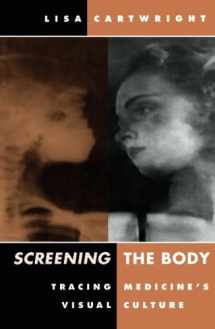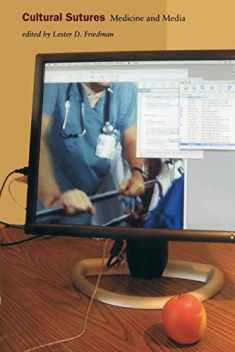
Screening The Body: Tracing Medicine’s Visual Culture
ISBN-13:
9780816622900
ISBN-10:
0816622906
Edition:
First Edition
Author:
Lisa Cartwright
Publication date:
1995
Publisher:
Univ Of Minnesota Press
Format:
Paperback
224 pages
FREE US shipping
on ALL non-marketplace orders
Marketplace
from $15.25
USD
Marketplace offers
Seller
Condition
Note
Seller
Condition
Used - Acceptable
Multiple copies. Solid paperback which may contain underlining, highlighting, bent corner pages, and margin notes. Still easily readable. Cover has moderate surface and corner wear. Binding is tight and square, no creases to spine.
Book details
ISBN-13:
9780816622900
ISBN-10:
0816622906
Edition:
First Edition
Author:
Lisa Cartwright
Publication date:
1995
Publisher:
Univ Of Minnesota Press
Format:
Paperback
224 pages
Summary
Screening The Body: Tracing Medicine’s Visual Culture (ISBN-13: 9780816622900 and ISBN-10: 0816622906), written by authors
Lisa Cartwright, was published by Univ Of Minnesota Press in 1995.
With an overall rating of 4.0 stars, it's a notable title among other
books. You can easily purchase or rent Screening The Body: Tracing Medicine’s Visual Culture (Paperback) from BooksRun,
along with many other new and used
books
and textbooks.
And, if you're looking to sell your copy, our current buyback offer is $0.3.
Description
Moving images are used as diagnostic tools and locational devices every day in hospitals, clinics and laboratories. But how and when did such issues come to be established and accepted sources of knowledge about the body in medical culture? How are the specialized techniques and codes of these imaging techniques determined, and whose bodies are studied, diagnosed and treated with the help of optical recording devices? "Screening the Body" traces the unusual history of scientific film during the late 19th and early 20th centuries, presenting material that is at once disturbing and engrossing. Lisa Cartwright looks at films like "The Elephant Electrocution". She brings to light eccentric figures in the history of the science film such as William P. Spratling who used Biograph equipment and crews to film epileptic seizures, and Thomas Edison's lab assistants who performed x-ray experiments on their own bodies. Drawing on feminist film theory, cultural studies, the history of film, and the writings of Foucault, Lisa Cartwright illustrates how this scientific cinema was a part of a broader tendency in society toward the technological surveillance, management, and physical transformation of the individual body and the social body. She frequently points out the similarities of scientific film to works of avant-garde cinema, revealing historical ties among the science film, popular media culture and elite modernist art and film practices. Ultimately, Cartwright unveils an area of film culture that has rarely been discussed, but which will leave readers scouring video libraries in search of the films she describes.


We would LOVE it if you could help us and other readers by reviewing the book
Book review

Congratulations! We have received your book review.
{user}
{createdAt}
by {truncated_author}



